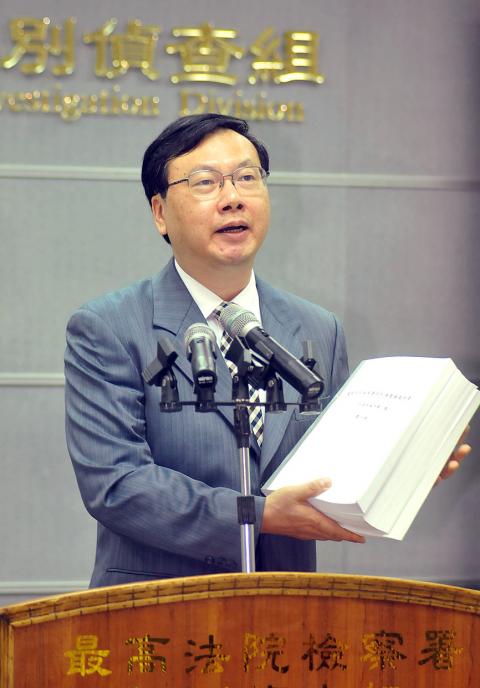Special prosecutors yesterday indicted former president Chen Shui-bian (陳水扁) for illegally seizing confidential government documents, the latest in a series of charges facing Chen, who is already serving a jail sentence for corruption.
Chen was indicted on the charge of violating the Classified National Security Information Protection Act (國家機密保護法), Supreme Prosecutors’ Office Special Investigation Division (SID) members said.
However, because Chen never released any of the documents to the public, prosecutors recommended that the court give the former president a relatively light sentence proportionate to the crime.

Photo: CNA
According to the indictment, Chen ordered close aides to pack and transport important documents from national security agencies, the Ministry of National Defense and the Ministry of Foreign Affairs to his personal office in Taipei after the March presidential election in 2008, when Chen’s Democratic Progressive Party was voted out of power.
Prosecutors said that after searches, inspectors discovered the former president had taken more than 17,000 documents, 3,419 of which were classified.
SID inspectors questioned people linked to the case 43 times and Chen himself at Taipei Prison, where he has been serving a 17-and-a-half-year sentence since late 2010.
While Chen told prosecutors he did not know how his aides handled the documents and that as president he had the right to destroy them, prosecutors said in the indictment it was against the law for him not to return the documents after leaving office on May 20, 2008.
The prosecutors alleged that Chen kept the documents for several reasons — to help him write a planned memoir and prepare for lawsuits in which he was involved and to collect evidence against other politicians.
The former president’s office yesterday afternoon called the indictment ridiculous and unfounded, adding that the fact that it was made one day after President Ma Ying-jeou’s (馬英九) inauguration raised serious questions about the SID’s motives. Chen’s office denied having done anything illegal and called for the abolishment of the SID, saying it was unworthy of the public.
Chen’s attorney, Cheng Wen-lung (鄭文龍), described the indictment as “political suppression.”
Cheng said the SID should be cracking down on irregularities involving incumbent government officials rather than on the former president, citing problems related to the production of an expensive musical, called Dreamers (夢想家), for the Republic of China centennial celebration last year, as well as the 2010 Taipei International Flora Expo.
Cheng also said that because the office of a former president is also defined as a public institution, Chen’s action could simply be described as moving the files from one public institution to another.
“It does not involve illegal conduct or corruption,” he said.
Additional reporting by Lee Hsin-fang

CALL FOR SUPPORT: President William Lai called on lawmakers across party lines to ensure the livelihood of Taiwanese and that national security is protected President William Lai (賴清德) yesterday called for bipartisan support for Taiwan’s investment in self-defense capabilities at the christening and launch of two coast guard vessels at CSBC Corp, Taiwan’s (台灣國際造船) shipyard in Kaohsiung. The Taipei (台北) is the fourth and final ship of the Chiayi-class offshore patrol vessels, and the Siraya (西拉雅) is the Coast Guard Administration’s (CGA) first-ever ocean patrol vessel, the government said. The Taipei is the fourth and final ship of the Chiayi-class offshore patrol vessels with a displacement of about 4,000 tonnes, Lai said. This ship class was ordered as a result of former president Tsai Ing-wen’s (蔡英文) 2018

‘SECRETS’: While saying China would not attack during his presidency, Donald Trump declined to say how Washington would respond if Beijing were to take military action US President Donald Trump said that China would not take military action against Taiwan while he is president, as the Chinese leaders “know the consequences.” Trump made the statement during an interview on CBS’ 60 Minutes program that aired on Sunday, a few days after his meeting with Chinese President Xi Jinping (習近平) in South Korea. “He [Xi] has openly said, and his people have openly said at meetings, ‘we would never do anything while President Trump is president,’ because they know the consequences,” Trump said in the interview. However, he repeatedly declined to say exactly how Washington would respond in

WARFARE: All sectors of society should recognize, unite, and collectively resist and condemn Beijing’s cross-border suppression, MAC Minister Chiu Chui-cheng said The number of Taiwanese detained because of legal affairs by Chinese authorities has tripled this year, as Beijing intensified its intimidation and division of Taiwanese by combining lawfare and cognitive warfare, the Mainland Affairs Council (MAC) said yesterday. MAC Minister Chiu Chui-cheng (邱垂正) made the statement in response to questions by Democratic Progressive Party (DPP) Legislator Puma Shen (沈柏洋) about the government’s response to counter Chinese public opinion warfare, lawfare and psychological warfare. Shen said he is also being investigated by China for promoting “Taiwanese independence.” He was referring to a report published on Tuesday last week by China’s state-run Xinhua news agency,

‘ADDITIONAL CONDITION’: Taiwan will work with like-minded countries to protect its right to participate in next year’s meeting, the foreign ministry said The US will “continue to press China for security arrangements and protocols that safeguard all participants when attending APEC meetings in China,” a US Department of State spokesperson said yesterday, after Beijing suggested that members must adhere to its “one China principle” to participate. “The United States insists on the full and equal participation of all APEC member economies — including Taiwan — consistent with APEC’s guidelines, rules and established practice, as affirmed by China in its offer to host in 2026,” the unnamed spokesperson said in response to media queries about China putting a “one China” principle condition on Taiwan’s